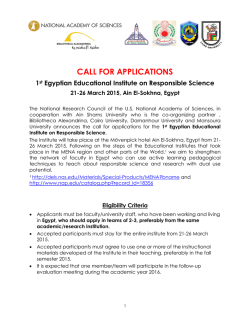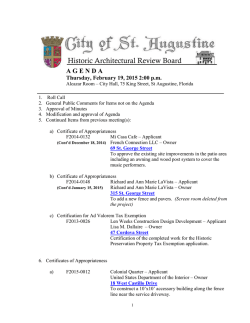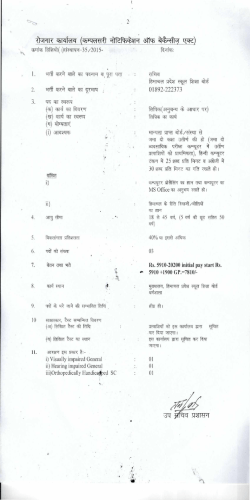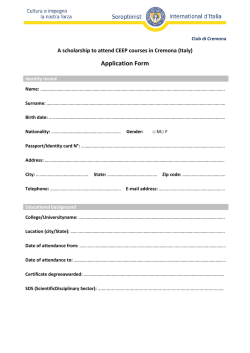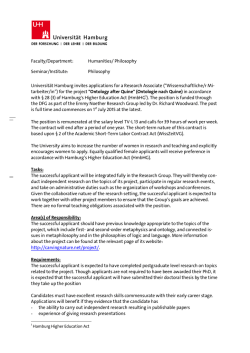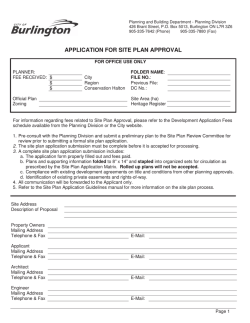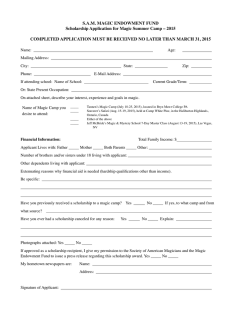
Medical Card/GP Visit Card National Assessment Guidelines for
Medical Card/GP Visit Card National Assessment Guidelines for People aged 70 years and over January 2015 1 Contents 1 PREFACE 3 2 INTRODUCTION 5 2.1 MEDICAL CARD ENTITLEMENT 2.1.1 GP VISIT CARD ENTITLEMENT 2.2 WHO IS ENTITLED TO A MEDICAL CARD/GP VISIT CARD UNDER THE SCHEME 2.3 WHO DECIDES ON AN APPLICANT’S ELIGIBILITY UNDER THE SCHEME? 5 5 5 7 3 7 MEANSTEST 3.1 INCOME LIMITS 3.2 ASSESSABLE INCOME 3.2.1 EMPLOYED PEOPLE – ASSESSABLE INCOME 3.2.2 SELF EMPLOYED PEOPLE - ASSESSABLE INCOME: 3.2.3 CHANGE OF INCOME 3.3 NON ASSESSABLE INCOME 3.4 SAVINGS OR SIMILAR INVESTMENTS 3.4.1 ASSESSMENT OF INTEREST 3.4.2 EXAMPLES: 3.5 PROPERTY 3.6 DEPENDENTS 3.6.1 SPOUSE OR PARTNER UNDER 70 YEARS 3.6.2 CHILD DEPENDANT 3.7 DECEASED SPOUSE OR PARTNER 3.7.1 SURVIVING SPOUSE OR PARTNER OVER 70 YEARS OF AGE 3.7.2 SURVIVING SPOUSE OR PARTNER UNDER 70 YEARS OF AGE 7 7 8 8 9 9 9 9 10 11 11 11 11 12 12 12 4 13 ASSESSMENTPROCESS 5LONGSTAY/RESIDENTIALCARE 14 5.1 NURSING HOMES 5.2 LONG STAY HOSPITAL PATIENTS 5.3 RESIDENTIAL CENTRES 14 14 14 6APPEALS 14 APPENDIXI:FINANCIALGUIDELINESFORMEDICALCARD/GPVISIT 15 CARDINCOMELIMITSFROMJANUARY2014 15 2 1Preface The Medical Card Scheme for people aged 70 years and over (“the Scheme”) has been revised with effect from 1st January 2014. The Scheme sees changes to the qualifying gross income thresholds for medical card eligibility and the introduction of assessment for GP Visit Card eligibility. The means test for the Scheme is based on gross income from all sources with the exception of • Specific compensation awards/redress awards and • Income from a certain amount of savings and similar investments, currently set at €36,000 for a single person and €72,000 for a couple. People aged 70 years or older with a gross weekly income not exceeding €500 a week for a single person or not exceeding €900 for a couple are entitled to a Medical Card under the Scheme. People aged 70 years or older with a gross weekly income over €500 and not exceeding €700 for a single person or over €900 and not exceeding €1,400 for a couple are entitled to GP Visit card under the Scheme. If a person has income in excess of the income limits for the Scheme, it is possible that he/she may still qualify under the General Medical Card/GP Visit Card Scheme, if his or her circumstances are causing financial hardship e.g. medical costs, nursing home costs etc. The general scheme, although having lower income thresholds, provides for income disregards and relevant outgoings to be taken into account in the assessment process. The HSE wishes to ensure that all who are aged 70 and over and their dependants, if any, who are entitled to a Medical Card or a GP Visit Card, will be facilitated to avail of their entitlement. The purpose of these guidelines are to assist the decision makers in the assessment of people aged 70 years and over in determining eligibility under the Scheme. If a person is in excess of the income limits s/he will be assessed under the General Medical Card/GP Visit Card Scheme in so far as they can with the information provided on the application. The HSE is committed to ensuring that decisions are taken in accordance with the best practice guidelines promoted by the Ombudsman. 3 Where a decision is taken to refuse eligibility or to grant a GP Visit Card, this decision will be communicated in writing and should incorporate a detailed explanation of the assessment made and the review and appeal processes. 4 2 Introduction 2.1 Medical Card Entitlement Medical Card entitlement, as issued by the Health Service Executive, confirms that the person and his or her dependants are entitled to a range of Health Services free of charge, which include: • General Medical & Surgical Services, including all inpatient services and outpatient services in a public ward in a public hospital (including consultant services). • A choice of General Medical Practitioner from those doctors who have a contract with the Health Service Executive. • Supply of prescribed approved medicines and appliances. • Certain Dental, Ophthalmic, and Aural services. 2.1.1 GP Visit Card Entitlement GP Visit Card entitlement can allow an individual and his/her dependants to visit their family doctor free of charge. Normal charges apply for all other services. A person granted a GP Visit Card should also apply for a Drugs Payment Scheme Card if s/he does not already have one. 2.2 Who is entitled to a Medical Card/GP Visit Card under the Scheme Entitlement to a Medical Card or GP Visit Card under the Scheme is means tested and is governed by legislation and regulations from the Department of Health. An applicant must: • be ordinarily resident in the State • satisfy a means assessment • provide proof of age (Birth Certificate/Passport/Drivers Licence). 5 A person in one of the following categories is exempt from a means test: • A person with EU/EEA entitlement • A person affected by the drug Thalidomide • A person affected by Symphysiotomy EU/EEA entitlement Under EU Regulation 1408/71 a person moving from one EU Member State to another retain the rights and advantages acquired through social insurance contributions which include access to health services. • EU pensioners resident in Ireland who are in receipt of a qualifying pension, as evidenced by form E121, are entitled to a Medical Card provided they are not subject to Irish social security legislation. Pensioners from the UK must provide proof that they are in receipt of a UK social security pension. The UK social security pension is the only qualifying UK pension for entitlement under EU legislation. • Any additional income to the qualifying pension not subject to PRSI is not taken into account when determining entitlement to a Medical Card (e.g. Occupational Pension, Investment Income etc.) • Dependants resident in Ireland of pensioners with entitlement under EU legislation are entitled to a Medical Card on production of a form E121 provided they (the dependants) are not subject to Irish social security legislation. A person affected by the drug Thalidomide • A person who has been affected by the drug Thalidomide is eligible for a Medical Card regardless of his or her level of income. A person affected by Symphysiotomy • A survivor of Symphysiotomy is eligible for a Medical Card regardless of her level of income. 6 2.3 Who decides on an applicant’s eligibility under the Scheme? The Health Service Executive is responsible for determining an applicant’s eligibility under the Scheme. Applications are processed centrally through the Primary Care Reimbursement Services. Assistance is available to applicants, as required, through their local health office. 3 Means Test 3.1 Income Limits People aged 70 years or older with a gross weekly income not exceeding €500 for a single person or not exceeding €900 for a couple are entitled to a Medical Card under the Scheme. People aged 70 years or older with a gross weekly income over €500 and not exceeding €700 for a single person or over €900 and not exceeding €1,400 for a couple, are entitled to GP Visit card under the Scheme. 3.2 Assessable Income Gross income from all sources, with the exception of those listed in Section 3.3.arising within the State or otherwise is assessable, including but not limited to, the following: 1. Income from any pension - (social welfare/occupational or private). This should include Social Welfare allowances such as; a. Over 80 years allowance, b. Living alone allowance, c. Island Allowance, etc. HSE Allowances such as; d. Domiciliary Care Allowance e. Blind Welfare Allowance. f. Mobility Allowance, etc. 2. Income from an employment or self employment, trade, profession or vocation 7 3. Income from savings and similar investments above specified limits 4. Payments in respect of Maintenance received 5. Rental income whether arising in the State or otherwise 6. Income from holding of an office or directorship e.g. member of a Board for which he/she receives a payment other than expenses 7. Income from fees, commissions 8. Payments under a settlement, covenant or from an estate 9. Income from royalties and annuities Please note: Income Tax, PRSI Income Levy and the Universal Social Charge are not deductible when calculating Gross Income 3.2.1 Employed People – Assessable Income The assessable income of an employed person is taken as the average weekly gross earnings. The documentation necessary to support the application and provide evidence of income is a current payslip and, if considered necessary, a recent P60. In arriving at the assessable income the HSE will average income over a number of weeks. 3.2.2 Self Employed People - Assessable Income: The assessable income of a self-employed person is determined as the average weekly Gross Income, including trade capital allowances. The documentation necessary to support the application and provide evidence of income is the Notice of Assessment and the Revenue Commissioners Form 11. Self-employed people are obliged to have Form 11 completed and submitted to Revenue before the Inspector of Taxes will issue a Notice of Assessment. In certain cases where a person is deemed to have a very low income, the Revenue Commissioners may determine that it is not necessary for that person to make a return of income for a set period of years. In such cases, the Revenue Commissioners issue a “Non Liable Notification Letter” advising the applicant of this. A copy of this letter should be presented on request. 8 3.2.3 Change of Income When carrying out a means assessment under the Scheme, the HSE will assess the person’s current average weekly gross earnings, usually evidenced by way of current payslip/current income statement. However, if the person’s current income does not reflect his/her general financial position going forward, the HSE will work out an appropriate average income which will reflect the person’s circumstances. 3.3 Non Assessable Income • Income from savings or similar investments up to €36,000 for a single person and up to €72,000 for a couple is not assessable (see 3.4 below). • Social Welfare non Cash Benefits o Free Electricity Allowance, o Free Travel or o Free Telephone rental o Free TV Licence o Free Fuel Allowance. 3.4 Savings or similar investments 3.4.1 Assessment of Interest Savings or similar investments of €36,000 for a single person or €72,000 for a couple are disregarded. • For amounts in excess of these limits a notional rate of interest will be applied to the savings. • The notional rate will be set by the HSE quarterly by taking an average of the current deposit interest rates of a number of the major Irish Banks & Building Societies on the 1st of January, April, July and October. • Alternatively where the applicant wishes s/he can have the actual rate applied by providing a certificate of interest paid on savings in the last full calendar year, and the HSE will apply this method of assessment. 9 • In respect of fixed term or long term savings products that apply the interest after a fixed number of years, and if the client so wishes, the HSE can take account of the interest earned in the year of maturity of the investment or can apply the notional rate to determine the income. In essence, only the interest or income earned on savings and similar investments will be counted as income, not the total values of the savings or investments themselves. For example, if you are single and you have €50,000 earning 2.11% interest, the income is counted as 2.11% of €14,000 (€50,000 less €36,000), which is €295.40 a year or €5.68 a week. Please note that any calculation of interest must be inclusive of Deposit Interest Retention Tax. 3.4.2 Examples: Savings Assessment for a person or couple aged 70 and over Annual Weekly Income Income Total Exempted Disregarded Total Interest Savings Compensation Savings Assessed Rate Single €100,000 € - €36,000 €64,000 2.03% €1,299.20 €24.98 Single €100,000 €40,000 €36,000 €24,000 2.03% € 487.20 € 9.37 Couple €100,000 € - €72,000 €28,000 2.03% € 568.40 €10.93 Couple €100,000 €40,000 €72,000 € 2.03% 0 Assessed Assessed € 0 € 0 Note: The following savings/investments are not assessable and will be disregarded: 1. Compensation awards to people who have contracted Hepatitis C or HIV from contaminated blood products, together with subsequent income from the investment of that money. 2. Compensation awards by way of the Residential Institutions Redress Board established under section 3 of the Residential Institutions Redress Act, 2002 (No. 13 of 2002). 10 3. Prescribed repayments made under Section 8 of the Health (Repayment Scheme) Act 2006 made: • to a living person. • to the spouse or former spouse of a living or deceased relevant person. • directly to a living child of a relevant person by virtue of Section 9 (8). 4. Ex-gratia payments approved by the Lourdes Hospital Redress Board under the terms of the Lourdes Hospital Redress Scheme 2007. 3.5 Property Income will not be assessed from property when establishing gross income (whether a family home, a holiday home or any other property) unless it is generating a rental income. The income to be assessed will be the actual income, less any cost necessarily incurred associated with the rental of the property and such costs may include insurance premia, mortgage repayments, maintenance, etc. 3.6 Dependents 3.6.1 Spouse or Partner under 70 years If one member of a couple is aged 70 or older, they will both qualify for a Medical Card if their combined gross income does not exceed €900 a week. If one member of a couple is aged 70 or older, they will both qualify for a GP Visit Card if their combined gross income is over €900 and not over €1,400 a week. The approved Medical Card or GP Visit Card will cover the dependants of a person aged 70 or older, i.e. spouse (under or over 70) and child dependants. 3.6.2 Child Dependant There is no adjustment to the income limits for a child dependant. However, if the applicant qualifies under the relevant income limit, any child dependant will also qualify for a Medical Card. 11 3.7 Deceased spouse or partner 3.7.1 Surviving Spouse or partner over 70 years of age In the event of the death of a person covered by the Scheme the surviving spouse/partner may retain the Medical Card or GP Visit Card for a period of 3 years following the death, providing that; • The death occurred on or after 1st January 2009 • The surviving spouse/partner was aged 70 or over at the time of the death He or she remains within the relevant income limits for a couple that are relevant to the period when the applicant is being assessed (HEALTH (ALTERATION OF CRITERIA FOR ELIGIBILITY) (NO. 2) ACT 2013 At the expiry of the 3 year period, he or she will be assessed under the single persons’ income limits 3.7.2 Surviving Spouse or Partner under 70 years of age If the surviving spouse or partner is under 70 yrs he or she will be assessed in accordance with the General Medical Card/GP visit card scheme using the appropriate income limits. 12 4 Assessment Process New applicants must complete a Form MC1(a) and submit it to PCRS for a decision. If the applicant feels, at the outset, that s/he does not qualify due to his or her Gross Income being in excess of the Income Limits, but has exceptional financial circumstances, s/he should complete and submit a Form MC1, which is an application under the main Scheme, instead. New Applications 1. People reaching 70 years of age should complete the application form MC1a. 2. Eligibility will be assessed under the guidelines for the Scheme. • If a person income is within the gross income guidelines as set out in this document, he or she will be granted a Medical Card or a GP Visit card, as appropriate, subject to confirmation of income details. 3. If the applicant’s income is in excess of the income limit for the Scheme, or is granted a GP Visit Card, the applicant will be informed and given details of his or her right of appeal. The applicant will be advised that he or she can be assessed for a Medical Card or GP Visit Card under the General Medical Card/GP Visit Card Scheme. It will be necessary for them to complete an application form MC1, and to submit that along with the relevant supporting documents to PCRS. 4. The HSE will carry out a full assessment under the General Medical Card/GP Visit Card Scheme. In such cases, careful consideration will be given to social, medical and other relevant circumstances of the applicant. The HSE will exercise discretion in responding to the needs of the applicant where it is satisfied that additional and/or exceptional circumstances exist. 5. Notification of decision and right of appeal will be provided to the applicant following assessment under either Scheme. 13 In addition to the above all people who reach 70 years of age on or after the 01/01/09 and who are granted a medical card will have their continued entitlement reviewed as appropriate by the HSE. This will involve standard and random reviews. 5 Long Stay/Residential Care 5.1 Nursing Homes Medical Card or GP Visit Card holders who continue to meet the income limits will retain their Medical Card or GP Visit Card while they are patients in private nursing homes. 5.2 Long Stay Hospital Patients People who are receiving in-patient services may have their eligibility continued but fees/capitation payments to the chosen General Practitioner will be suspended by the Health Service Executive where GP and Surgical services are provided for such patients within the Hospital. 5.3 Residential Centres The range of services available may vary from residential centre to residential centre. In this regard it is imperative that the Health Service Executive make arrangements to provide a comprehensive range of services to meet all patient needs. Particular attention may be needed for those resident on a five day week basis. Their needs at weekends may best be met through local arrangements. 6 Appeals When the entire assessment process has been completed and results in a refusal or the grant of a GP Visit Card the applicant will be advised in writing of the HSE’s decision and his or her a right of appeal. 14 Appendix I: Financial Guidelines for Medical Card /GP Visit Card Income Limits from January 2014 Medical Card and GP Visit Card Income limits for Applicants aged 70 years or older Single Person or Widow/Widower over &) (not married, not cohabiting, not in a civil partnership) Married Persons/Cohabiting Persons and Persons in a Civil Partnership Aged 70 and Over Combined Gross Income. Medical Card Gross Weekly Rate GP Visit Card Gross Weekly Rate Below €500 Over €500 not exceeding €700 Below €900 Over €900 not exceeding €1,400 General Medical Card / GP Visit Card Guidelines Medical Card Weekly Rate GP Visit Card Weekly Rate Aged up to 65 years €184.00 €276.00 Aged 66 years and over €201.50 €302.00 Aged up to 65 years €164.00 €246.00 Aged 66 and over €173.50 €260.00 €266.50 €400.00 €298.00 €447.00 Single Person Living Alone (not married, not cohabiting, not in a civil partnership) Single Person Living with Family (not married, not cohabiting, not in a civil partnership) Married Persons, Cohabiting Persons and Persons in a Civil Partnership Combined Income Aged up to 65 years Aged 66 and over 15 Allowances Per Child Per Child €38.00 €57.00 €41.00 €61.50 €39.00 €58.50 €42.50 €64.00 €78.00 €117.00 Allowance for first 2 children under 16 financially dependant on applicant For 3rd and subsequent children under 16 financially dependant on applicant Allowance for first 2 children over 16 years financially dependant on applicant For 3rd and subsequent children over 16 yrs financially dependant on applicant For a dependant over 16 years who is in full time third level education and not grant aided - Under the Main Scheme additional allowances will be given for: o Reasonable expenses incurred in respect of rent or mortgage payments o Reasonable expenses incurred in respect of childcare costs o Reasonable expenses incurred in travel to work - The assessment of eligibility for Medical Cards and GP Visit Cards is based on the combined income of the applicant and spouse or partner (if any) after tax PRSI and USC have been deducted. - Applicants, whose weekly incomes are derived solely from Social Welfare or Health Service Executive allowances/ payments, who are in excess of the Financial Guidelines (either at first application or on renewal), will be granted Medical Cards. 16
© Copyright 2026
